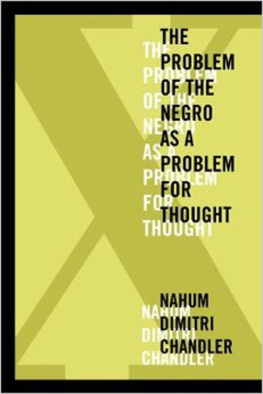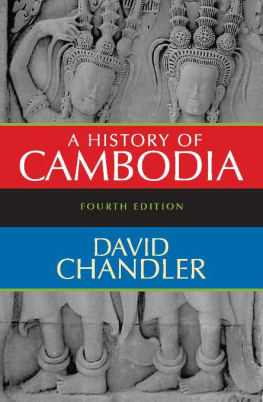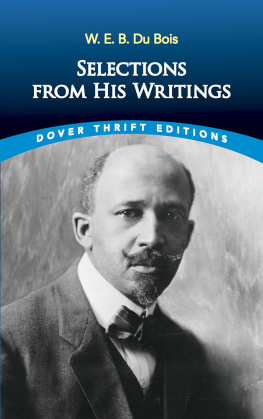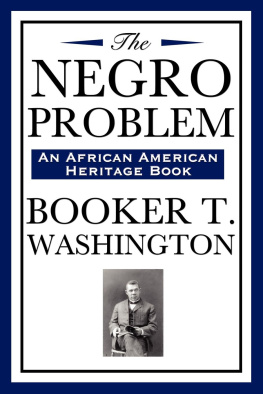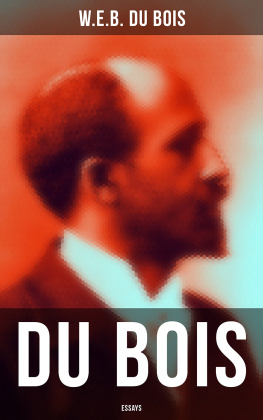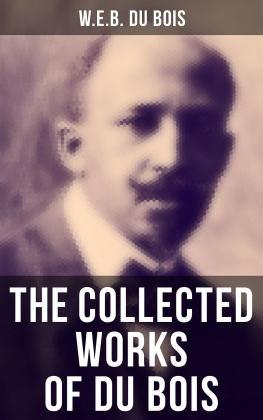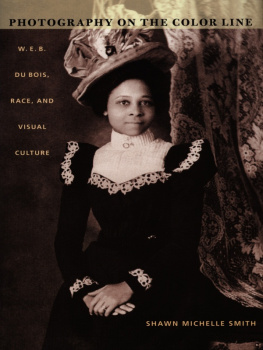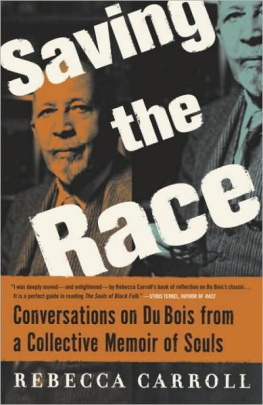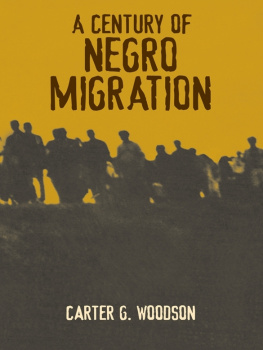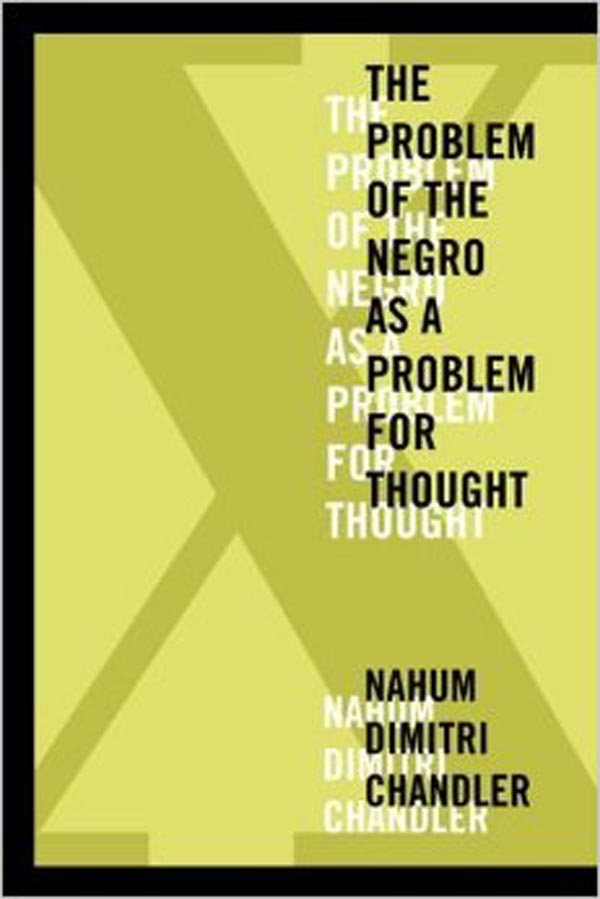American Philosophy
Douglas R. Anderson and Jude Jones, series editors
XThe Problem of the Negro as a Problem for Thought
Nahum Dimitri Chandler
Fordham University Press New York 2014
Copyright 2014 Fordham University Press
All rights reserved. No part of this publication may be reproduced, stored in a retrieval system, or transmitted in any form or by any meanselectronic, mechanical, photocopy, recording, or any otherexcept for brief quotations in printed reviews, without the prior permission of the publisher.
Fordham University Press has no responsibility for the persistence or accuracy of URLs for external or third-party Internet websites referred to in this publication and does not guarantee that any content on such websites is, or will remain, accurate or appropriate.
Fordham University Press also publishes its books in a variety of electronic formats. Some content that appears in print may not be available in electronic books.
Library of Congress Cataloging-in-Publication Data is available from the publisher.
First edition
A book in the American Literatures Initiative (ALI), a collaborative publishing project of NYU Press, Fordham University Press, Rutgers University Press, Temple University Press, and the University of Virginia Press. The Initiative is supported by The Andrew W. Mellon Foundation. For more information, please visit www.americanliteratures.org.
Contents
For the appearance of this work, I must, above all, thank my editor at Fordham University Press, Helen Tartar. And, I am most deeply thankful. For, since first speaking with me in the autumn of 1993 about the project of which this book is an expression, she has remained steadfastfor what is now a generation of thought, at leastin her affirmation of my efforts to think the work of W. E. B. Du Bois anew and to address certain concerns in modern social thought from my somewhat peculiar path of thinking. A scholar, a writer, simply could not hope for more, in a lifetime. She has, indeed, changed my world. I hope that herein she can find some sense of the measure of my gratitude and appreciation, as well as some retrospective value in seeing this discourse into a new public presentation. And for that event, such as it is, I also thank Tom Lay of Fordham Press, who with the kindest prodding has shepherded this book into its present form, and Tim Roberts, of the American Literatures Initiative.
Then, this text was gifted with two anonymous readers, who were kind enough to make themselves known to me, Fred Moten and David Lloyd. It is hard to imagine any other two readers who might have engaged the study in such a fundamental manner, affirmatively critical to the limit, in such a way as to not only push me to render this discourse at the highest level that I could bring to the table, now, but by way of their own exemplary paths of inquiry and questioning, to recognize my own work as part of a renewed horizon of shared discourse and urgent concern with thinking anew today. When this study grows up, I hope that it will be like Davids own beautiful discourse under the heading Irish Times: Temporalities of Modernity (Keough-Naughton Institute for Irish Studies at the University of Notre Dame, 2008) from which I drew inspiration in my final revisions to my own study, with which it shares much, in particular on its lower frequencies, as Ralph Ellison suggested in another context. And then, too, for me, Fred Moten has been from our first discussion the first voice of my generation to which I listen; to discover in the event that he had given a listen to this locutionanonymously, as it wereheartened me to try to bring to it another order of voice. I hope that he hears herein, and on every page, all that we share.
And then, from somewhere near the mid-point of the journey entailed in the making of this book, Franc Nunoo-Quarcoo and Maria Phillips became essential to its realizationmost fundamentally, in matters of the spirit. They have been there, always, at the other end of the line, waiting, patiently, affirmatively, ever-hopeful. A master of the graphic arts, Franc has tendered his remarkable genius for the shaping of the cover design. For their contribution to both layers of its form, both its inside and its outside, this book, then, belongs also to them.
For those who know what it means to write, they will doubtless understand that I write with two hands: one is that of my wife, Ayumi, as she attends to certain practices of our shared life, in particular the close care just now of the still toddler son, Aaron Eisuke, that we share and hold together in family; the other, is mine, as I try to trace in outline the night-lines and dreams that come to me in the darkness of thought, inscribing them, attending thus to other forms of our life, sharing them with her, all the while. This book is hers too. Her dreams, at least some of them, are recorded here, just as well as mine. I hope all who read it remember this.
At the outset of any textual reference, I must thank Danielle Kovacs, curator of collections in the Department of Special Collections and University Archives at the W. E. B. Du Bois Library of the University of Massachusetts Libraries, and the trustees of the David Graham Du Bois Memorial Trust, respectively, for assisting me on numerous matters over many years and for ensuring scholarly access to so much work by and about W. E. B. Du Bois, most especially that contained in the papers of W. E. B. Du Bois housed at Amherst.
Anacrusis, the opening text for this study, was published in an earlier, slightly shorter version, without certain annotations (which, although mainly prepared in the autumn of 1991, are presented here for the first time), under the title Between in Assemblage: A Critical Journal of Architecture and Design Culture 20 (April): 2627. I thank Thomas Keenan and Eduardo Cadava for the suggestion of the idea, and Mark Wigley as guest editor, for the invitation to contribute to the special issue Violence Space. During the time of the first composition of this text, Sue Hemberger, academic officemate and intelligence extraordinaire, the eighth wonder of the world, in my judgment, read every line and affirmed the thought at its inceptionwhich still means the world to me.
Chapter 1, Of Exorbitance: The Problem of the Negro as a Problem for Thought, was previously published in a form proximate to its presentation here in Criticism: A Quarterly Journal for Literature and the Arts 50, no. 3 (2008): 345410. I thank Wayne State University Press and Jonathan Flatley of Criticism for permission to republish it. An early version of some sections of this chapter were presented at the conference The Academy and Race: Toward a Philosophy of Political Action, sponsored jointly by the Department of Philosophy and the Department of Africana Studies at Villanova University, March 810, 1996, and subsequently published in Callaloo: A Journal of African American and African Arts and Letters 19, no. 1 (1996): 7895; thus, I also thank Callaloo and its editor Charles Rowell, for kind consent to the republication of those revised sections here. That important conference was organized by Kevin Thomas Miles, who remains for me a principal philosophical interlocutor on these matters. Several diverse configurations of thought, position, and intellectual generation were gathered for the first time at that conference, and the impact of the interlocutions inaugurated there remain widely distributed, even if not always explicitly so, across the disciplines of philosophy, literature (comparative as well as English), and the social sciences, in the United States. It thus remains a signal moment for my own intellectual generation. (See Chapter 1 note 55 below for references on this matter.) I also thank Mae G. Henderson and Julie Elizabeth Byrne for conversations related to the development of the earlier version of this chapter. The second half of the chapter was initially brought to full formulation during my year as a member of the School of Social Science at the Institute for Advanced Study, Princeton, New Jersey. While there, I was supported by fellowships from the National Endowment for the Humanities and from the Ford Foundation that I wish to acknowledge and for which I remain grateful. As well, I received the support of the faculty, staff, and other members of the School of Social Science during the 199899 academic year. I thank the faculty of the school, especially Professors Joan Scott and Michael Walzer, and the late esteemed scholars, Clifford Geertz and Albert O. Hirschman (in particular the latter, who by way of a fundamental sense of hospitality, took a notable interest in my concerns with the work of W. E. B. Du Bois), for their intellectual generosity and hospitality during that time. Above all, the interlocution of Professors Charles Sheperdson, Thomas Flynn, Nancy Hirschman, and Kamran Ali, for which I am deeply thankful, often led me to think further on these matters than I had yet thought possible. Just as important, I wish to note in deepest thanks that this essay in the first full version of its present form was prepared during the autumn of 2004 in Zarautz, in the Basque Country, on the northern coast of Spain, where I was able to remain for a time and write, through the kind generosity of Karmele Troyas and Arturo Coello Leyte and through the careful life friendship of Alberto Moreiras and Teresa Vilars-Soler, while on a sabbatical.

